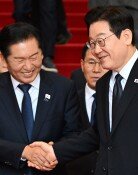Alteration of U.S. Policy to Iraq Seems Probable
Alteration of U.S. Policy to Iraq Seems Probable
Posted November. 04, 2003 22:43,
The U.S. strategy against Iraq is standing at the crossroads ever since George W. Bush, the president of the U.S., declared Major battle has completed six months ago.
A total of 239 soldiers and officers of the U.S. army were killed in action in the recent six months. As of late, the resistance forces of Iraq has increased its level of attacks, including trench mortar raids on U.N. and Red Cross facilities and on the hotel where the deputy secretary of defense of the U.S. had stayed.
There are also many complaints that egg on the U.S. government to doctor up its strategy against Iraq, since the conflicts between the improvised governing committee of Iraq and the U.S. military government have reached a dangerous level.
The enemies in Iraq believe that the U.S. troops will run away, said President Bush, on November 3, at an address to the chiefs of the small companies in Birmingham, Alabama, further confirming that, We will follow through on our duties in Iraq.
The spokesperson of the White House also confirmed, Our decision and our will are firm and determined. The best shortcut to victory against the terrorists is to fight them.
Public Opinion Worsens: The Wall Street Journal on November 3 touched on the issue that many members of the improvised Iraq governing committee have turned down offers to participate in the meetings presided by Paul Brimmer, the chief of the U.S. military government in Iraq, setting forth their uneasiness to the U.S. occupants.
The Wall Street Journal also advised that President Bush should be more concerned about the tangled relations between the Iraqis and the U.S. occupants, when it reported that on October 28, Bush had remarked to hand over more authority and responsibility to the committee, hinting on a Midpoint Correction of its policy to Iraq.
The joint survey of public opinion, held by Washington Post and ABC, which was released on November 2, showed that the figure for those who dont support Bushs policy in Iraq reached 51 percent. This figure has doubled from the survey six months before. Also, the public support of Bushs policy has fallen under 50 percent for the first time.
Correction on Strategy against Iraq: Even before the war ended, the U.S. government had plans to reduce its force stationed at Iraq to under 60,000, but there are still over 120,000 U.S. soldiers and officers in Iraq.
The Bush administration has firmly denied it, but they are still looking for the exit, said Andrew Bushbitz (Reserved Colonel) in an interview with the Washington Post, anticipating that, The political season (Preliminary Election) has been getting close, and there will be many request which will urge where to get out of Iraq, even in the White House.
The U.S. government is considering the measure to hand over the civil police affairs to the former Iraqi armed forces. This measure seems to have concerns with the trends mentioned above. We are putting in the former Iraqi soldiers to become newly founded military units, remarked Donald Rumsfeld, secretary of U.S. Department of Defense on November 2.
The Democrats pointed out that the armed forces can not immediately walk out of it, so the roles of the current U.S. forces in Iraq have to be taken over by the international society.
The U.S. forces have to stay on until perfect peace settles down in Iraq. In order to do that, NATO and many other countries have to back us up, asserted Georgeff Bithen, the Democratic senator. Former U.S. President Bill Clinton also focused, saying, Direct quitting should never be considered. We have to think over whether U.N. and NATO can be our substitutes in Iraq.
maypole@donga.com






![[속보]한덕수 1심 징역 23년 선고…“내란 가담자 중벌 불가피”](https://dimg.donga.com/c/138/175/90/1/wps/NEWS/IMAGE/2026/01/21/133201789.1.jpg)
